Hybrid AF Therapy to Treat Atrial Fibrillation
Why Treating Your Atrial Fibrillation Is So Important
Atrial fibrillation (Afib, AF) is the most commonly diagnosed abnormal heart rhythm (arrhythmia) in the U.S.: 1
- 8 million people in the U.S. have Afib1
- 2 million people in the U.S. are diagnosed with Afib each year1
- 1 in 4 adults will develop Afib in their lifetime2
- 33 million people around the world have Afib3
Atrial fibrillation is an abnormal heart rhythm caused by erratic electrical signals in the heart. A normal heart rhythm creates regular electrical signals that travel through the heart. The signals are essential for the heart to beat in a steady, rhythmic way. This allows blood to be pumped to all parts of the body. Sometimes the electrical signals become irregular, and the heart beats abnormally.
Atrial fibrillation is also called Afib or AF. If not properly treated, it can grow worse over time and possibly damage your heart. Atrial fibrillation can also lead to health problems:
5x increase in stroke risk4
5x increase in heart failure development5
Atrial fibrillation also leads to a higher risk of:6
- Chronic fatigue
- Decreased activity level
- Decline in quality of life
It’s best to have atrial fibrillation treated before it progresses and causes other health problems.7
Even after people develop other heart problems, there is hope. When atrial fibrillation is successfully treated it can:
- Reverse the stretching of the left atrium7
- Improve heart function overall7
- Improve your symptoms8
- Reduce the number of heart medications you need7
Causes of Atrial Fibrillation
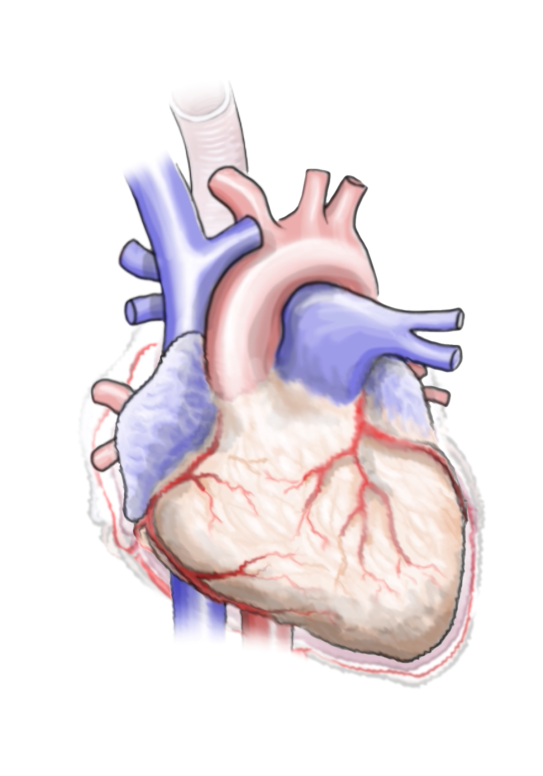
Medical Conditions
Conditions that may cause people to develop atrial fibrillation include:9- Diabetes—The glucose (blood sugar) imbalance that occurs with diabetes can directly affect the tissues of the heart.
- Obesity—This puts a person at higher risk for atrial fibrillation.
- Sleep apnea—When a person is awakened by lack of oxygen from sleep apnea, it stresses the heart. It can also cause chemical changes inside the heart.
- Overactive thyroid gland—When the thyroid is too active, it increases the heart rate.
- Heart attacks
- Heart failure
- Heart valve disease
- Coronary artery disease
- High blood pressure
- Aging
- Family history of atrial fibrillation
- Smoking—The risk seems to increase for long-term smokers. But the risk lowers if you quit.
- Stress—Emotional stress, including panic disorders, can also put someone at higher risk of atrial fibrillation.
- Alcohol—Alcohol consumption, and especially binge drinking, raises a person’s risk.
- Caffeine—Caffeine increases the heart rate, which can trigger atrial fibrillation.10
- The base of the pulmonary veins (PV)
- The posterior (back) wall
- The left atrial appendage (LAA)
The Stages of Atrial Fibrillation—And How It Affects Your Health

- Palpitations
- Fluttering feeling in the chest
- Rapid or irregular heartbeat
- Persistent Afib
- Long-standing persistent Afib
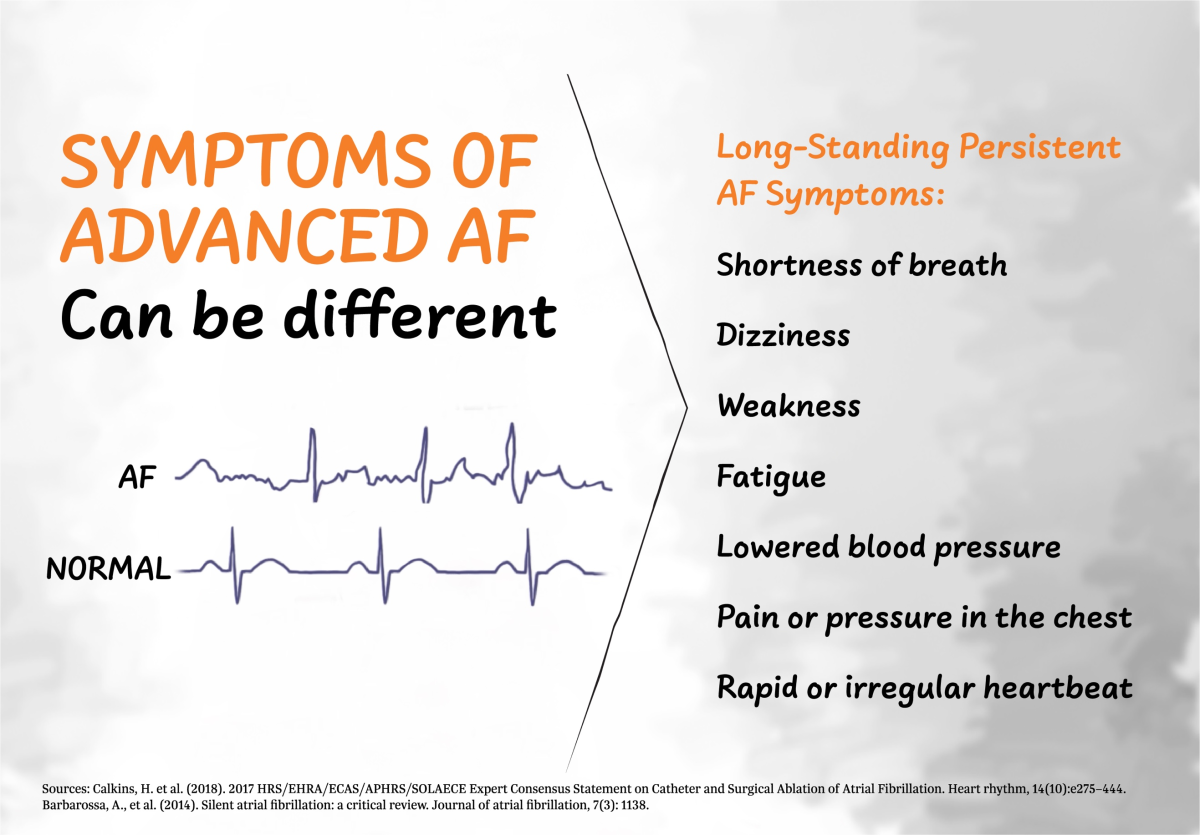
- 45% of all AFib patients
- 5 million people in the United States
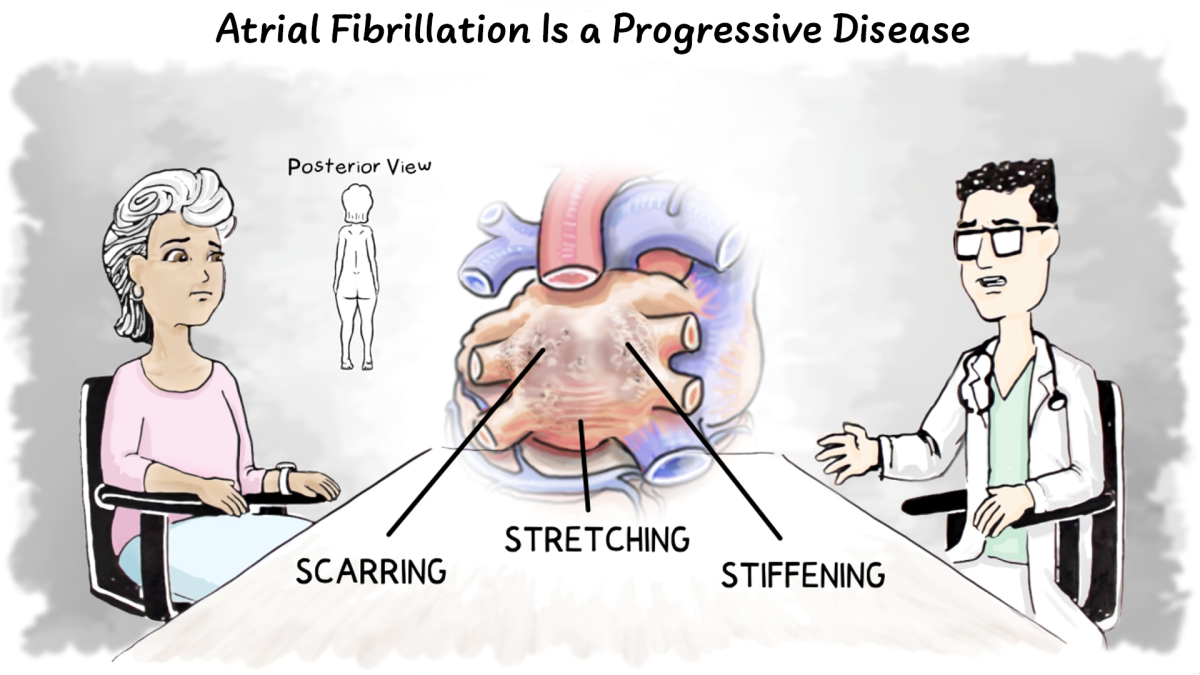
- Stroke
- Heart failure
- Dementia
- Chronic fatigue
- Decreased activity level
- Decline in quality of life
- Sudden death
Treatments for Atrial Fibrillation
Treatments for Atrial Fibrillation
Treatments vary, depending on the stage of atrial fibrillation. Because undertreated atrial fibrillation can progress to more advanced stages, it is very important to talk with your healthcare provider about proper treatment.
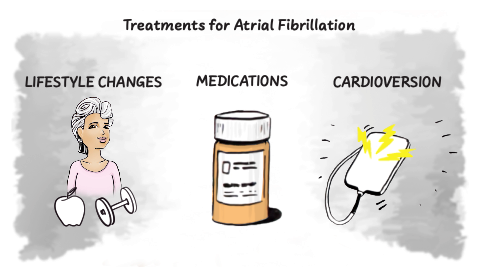
Lifestyle Changes
- Make exercise and healthy food choices a part of your daily life.
- If needed, get a sleep study to find out if you have sleep apnea and need CPAP therapy.
Medications
Medications can help a person in different ways:
- Medications can treat blood pressure, diabetes, or an overactive thyroid.
- Blood thinners can reduce the risk of stroke.
- Rate control medications slow the heartbeat.
- Rhythm control medications help control the heart rhythm.
Cardioversion
Cardioversion is done at a hospital or clinic. This therapy delivers a controlled electric shock to the outside of the chest to restore a normal heart rhythm.
If your symptoms continue and are not controlled by medications, your doctor may consider ablation therapy.
Different Types of Ablation
Ablation creates lesions, or barriers, on the heart tissue in an effort to stop the erratic electrical signals that cause atrial fibrillation. There are 2 types of ablation:
- Endocardial radiofrequency (RF) ablation: Treats the inside the heart—it is most often used to treat paroxysmal atrial fibrillation, an earlier stage of Afib.
- Epicardial ablation: Treats the outside the heart
Hybrid AF™ Therapy combines both types of ablation. It creates lesions inside (endocardial RF) and outside (epicardial) of the heart. Hybrid AF Therapy is used to treat long-standing persistent atrial fibrillation.
The goal of an ablation is to stop the atrial fibrillation, or to make the episodes shorter and less frequent.
Details About Hybrid AF Therapy
If you have long-standing persistent atrial fibrillation, your doctor might recommend Hybrid AF Therapy.
Benefits of Hybrid AF Therapy
Consider the benefits of Hybrid AF Therapy.8,12
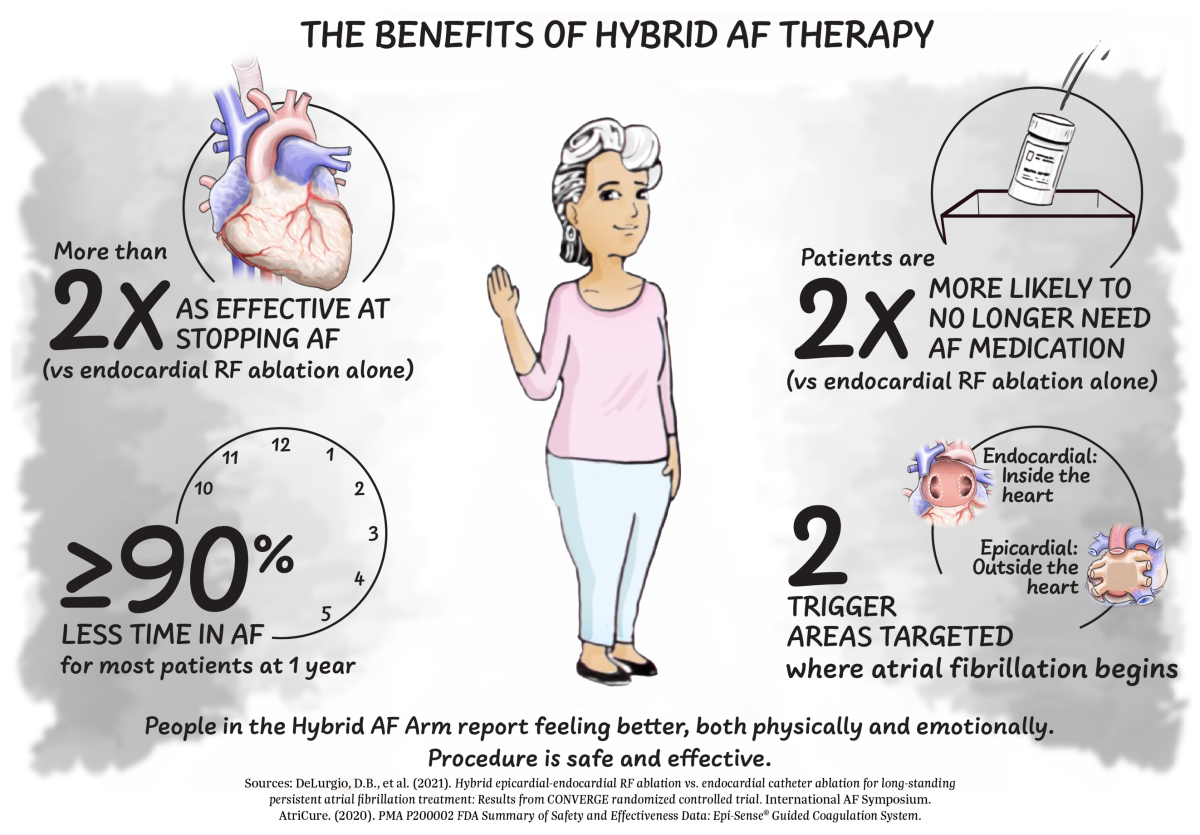
Step 1 of Hybrid AF Therapy: Lesions on the Outside of the Heart
Epicardial (outside of the heart) lesions target areas of the heart that cannot be reached from the inside of the heart.
- The doctor makes a small 2–3 cm incision under the breastbone.
- Once the doctor has access to the heart, lesions are created across the posterior (back) wall.
- These epicardial lesions overlap to create a barrier to the erratic electrical signals that cause atrial fibrillation.
Step 2 of Hybrid AF Therapy: Lesions on the Inside of the Heart
Endocardial (inside of the heart) lesions target areas of the heart that are difficult to reach from the outside.
- A second doctor makes a small incision in the femoral vein in the upper thigh. This allows access to your heart through the vein.
- The doctor looks at an electrical “map” of your heart. It can show any remaining abnormal electrical signals after your first procedure.
- The doctor then creates lesions at the pulmonary veins and at any areas that still have abnormal electrical activity.
Your hospital stay will be typically two to three days. Your doctor will:
- Prescribe medication to prevent inflammation soon after the procedure
- Tell you when you can resume taking needed heart medications
- Tell you if you may be able to stop taking certain heart medications
Before you leave the hospital, you will be given a card with important information about your procedure and medications. It also tells you whom to call if you have questions. Keep this in your wallet or purse.
Your healthcare team will tell you when you can return to your daily activities.
The goal of ablation treatment for atrial fibrillation is to stop the irregular heart rhythm or reduce Afib episodes, so that they are shorter and less frequent. This helps the heart return to a more normal size, pump better and improve its function overall.7
Is Hybrid AF Therapy Right for You?
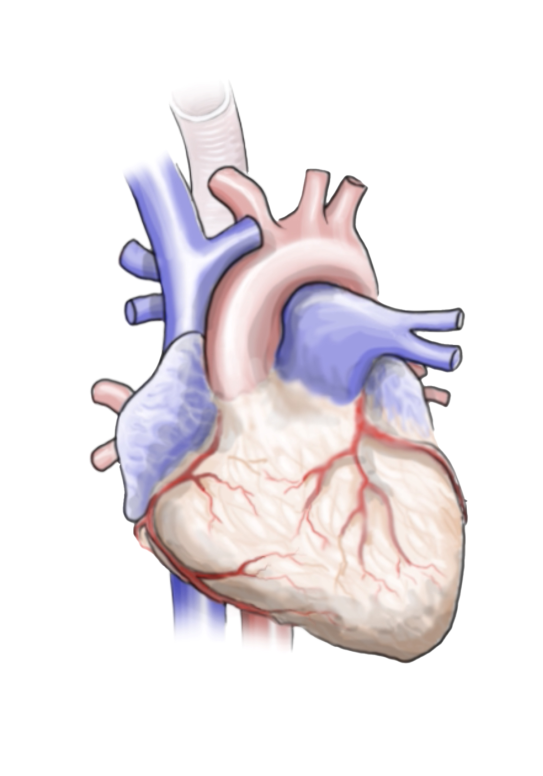
It may be, but only a health care provider can determine the best treatment for you.
When Hybrid AF Therapy effectively stops atrial fibrillation, there can be other important benefits to the heart:
- Reverse the stretching of the left atrium7
- Improve heart function overall7
- Improve your symptoms8
- Reduce the number of heart medications you need to take7
Talk to your doctor about how to find the right treatment for your stage of atrial fibrillation.
Sources/Risk Information
- Colilla, S. et al. (2013). Estimates of current and future incidence and prevalence of atrial fibrillation in the U.S. adult population. American journal of cardiology, 112(8), 1142-1147.
- Lloyd-Jones, D.M., et al. (2004). Lifetime risk for development of atrial fibrillation. Circulation, 110, 1042-1046. doi: 10.1161/01.CIR.0000140263.20897.42
- Rahman, F., et al. (2014). Global epidemiology of atrial fibrillation. Nature reviews cardiology, 11, 639-654. https://doi.org/10.1038/nrcardio.2014.118
- Benjamin, E.J., et al. (2019). Heart Disease and Stroke Statistics — 2019 Update: A Report From the American Heart Association. Circulation, 139m e56-e528, DOI: 10.1161/CIR.0000000000000659
- Odutayo, A. et al. (2016). Atrial fibrillation and risks of cardiovascular disease, renal disease, and death: systematic review and meta-analysis. BMJ, 354, i4482.
- Calkins, H. et al. (2018). 2017 HRS/EHRA/ECAS/APHRS/SOLAECE Expert Consensus Statement on Catheter and Surgical Ablation of Atrial Fibrillation. Heart rhythm, 14(10):e275-444.
- Benussi, S., & de Maat, G.E. (2018). Atrial remodelling and function: implications for atrial fibrillation surgery. European journal of cardio-thoracic surgery, 53(i1):i2–i8, https://doi.org/10.1093/ejcts/ezx340
- AtriCure. (2020). PMA P200002 FDA Summary of Safety and Effectiveness Data: Epi-Sense® Guided Coagulation System.
- National Institutes of Health. Atrial Fibrillation. Accessed November 2020. Retrieved from https://www.nhlbi.nih.gov/health-topics/atrial-fibrillation.
- WebMD. Atrial Fibrillation: Causes, Risk Factors, and Triggers. Accessed December 2020. Retrieved from https://www.webmd.com/heart-disease/atrial-fibrillation/causes-risks-triggers-afib.
- Barbarossa, A., et al. (2014). Silent atrial fibrillation: a critical review. Journal of atrial fibrillation, 7(3),
- http://www.jafib.com/PMC/XML/Inprogress/1138/1138pdf_federico_guerra.pdf
- DeLurgio, D.B., et al. (2021). Hybrid epicardial-endocardial RF ablation vs. endocardial catheter ablation for long-standing persistent atrial fibrillation treatment: Results from CONVERGE randomized controlled trial. International AF Symposium.
Hybrid AF Therapy is for the treatment of long-standing persistent atrial fibrillation.
Risk Information: This procedure is not recommended for patients with Barrett’s Esophagitis, presence of left atrial thrombus (clot), a systemic infection, or an active infection local to the surgical site at the time of surgery (i.e. active endocarditis).
Potential procedural complications include, but are not limited to: Pericardial effusion, pericarditis, infection, cardiac tamponade, pulmonary vein stenosis, vessel injury, tissue perforation, excessive bleeding, phrenic nerve injury, left atrial rupture, esophageal fistula, heart attack, new arrhythmias, thromboembolic complication, stroke/TIA/neurologic complication, complete heart block requiring permanent pacemaker implantation, serious skin burn, a buildup of fluid around your lungs, or death.
This information is not comprehensive. Talk to your health care provider to obtain the FDA-approved product labeling or visit www.AtriCure.com.
Rx Only.
